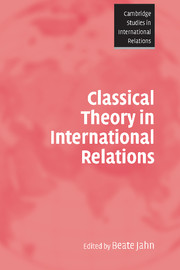Book contents
- Frontmatter
- Contents
- Notes on contributors
- Acknowledgements
- 1 Classical theory and international relations in context
- Part I Intellectual contexts
- Part II Political contexts
- Part III Lineages
- 9 The ‘other’ in classical political theory: re-contextualizing the cosmopolitan/communitarian debate
- 10 Images of Grotius
- 11 The Hobbesian theory of international relations: three traditions
- 12 Re-appropriating Clausewitz: the neglected dimensions of counter-strategic thought
- Index
- CAMBRIDGE STUDIES IN INTERNATIONAL RELATIONS
12 - Re-appropriating Clausewitz: the neglected dimensions of counter-strategic thought
Published online by Cambridge University Press: 22 September 2009
- Frontmatter
- Contents
- Notes on contributors
- Acknowledgements
- 1 Classical theory and international relations in context
- Part I Intellectual contexts
- Part II Political contexts
- Part III Lineages
- 9 The ‘other’ in classical political theory: re-contextualizing the cosmopolitan/communitarian debate
- 10 Images of Grotius
- 11 The Hobbesian theory of international relations: three traditions
- 12 Re-appropriating Clausewitz: the neglected dimensions of counter-strategic thought
- Index
- CAMBRIDGE STUDIES IN INTERNATIONAL RELATIONS
Summary
The art of war deals with living and with moral forces.
Carl von Clausewitz's On War is widely regarded as the most influential text for the traditions of military-strategic thought and practice that have attended the development of modern State power. Colin Gray declares it the only truly classical theory of war written in the modern era. Clausewitz's statement that war is to be understood as ‘nothing but the continuation of policy with other means’ remains the most influential definition of the concept not only for military-strategic thought but for the major traditions of thinking about international politics in which the study of war continues to be a central preoccupation. While the ontological veracity of the definition of war as a continuation of politics is increasingly debated, theorists of war still tend overwhelmingly to assume Clausewitz's dictum as a recommendation for the management of its instrumentality. Ensuring the subordination of war to the political ends of sovereignty remains the central tenet of neo-Clausewitzian military-strategic thought.
Yet Clausewitz's thought has played as important a formative role in the development of a tradition of thinking about war for which sovereignty is political anathema. That tradition is what I call counter-strategic thought. Counter-strategic thought is a tradition of thinking concerned with intensifying critical understandings of the depths and modalities of relations between war and modern formations of power.
- Type
- Chapter
- Information
- Classical Theory in International Relations , pp. 277 - 295Publisher: Cambridge University PressPrint publication year: 2006
- 4
- Cited by



